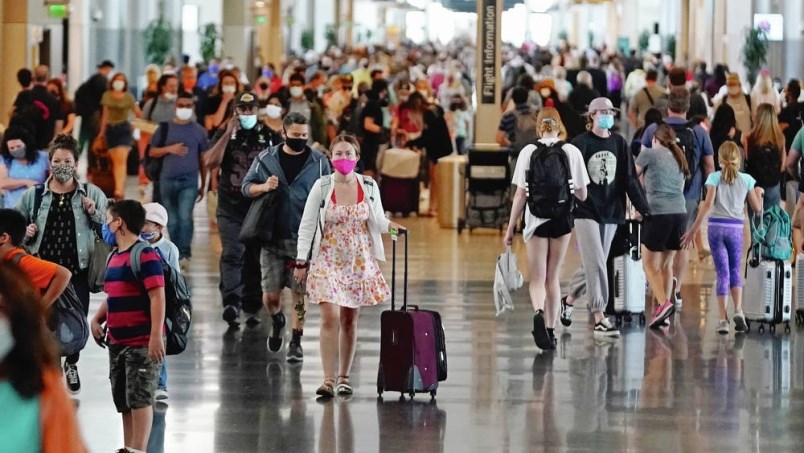Sandra Rowan says she is on the cusp of cancelling flights to visit her son’s family in California this month after facing what she believes is a needlessly complicated pre-flight COVID testing process.
Rowan, who has not seen her granddaughter since March of last year, said the stress created by the process to get tested before flying to the U.S. is piling anxiety on anxiety.
“It’s so convoluted and complicated in my mind — there are too many variables that can go wrong,” she said.
The U.S. Centers for Disease Control and Prevention requires all air travellers to the U.S. to get tested no more than three days before travelling. Passengers have to show their negative result or documentation of having recovered from COVID-19 to the airline before boarding.
Passengers are also expected to fill out an attestation on board the flight that they have tested negative or recovered fully from COVID in the past three months and been cleared to travel.
Rowan said with such a short window and few testing options on the Island for those who have been fully vaccinated and are asymptomatic, there are just too many things that can go wrong.
Rowan said with the ever-present concern of flights being delayed, which could mean a COVID test is no longer valid, the chance of false positives and the general anxiety caused by the pandemic, it feels overwhelming.
“The added anxiety of whether we’ll get on a plane and once down there, where do we get tested to get back, is just too much,” she said, adding the elation she felt when Ottawa announced the quarantine requirement would be scrapped for fully vaccinated Canadians returning home by air is gone.
And that’s without factoring in the cost.
Rowan said when she inquired at one of the three Victoria firms that offer private COVID tests for travellers, she was told it would be $295.
“It’s the same amount as the airfare, so we’d be doubling our cost,” she said, conceding she naively thought they could go to a testing centre, or even find a spot at the airport where they could pay a $50 or $100 fee to be tested. “I thought someone would have organized it to be simple.”
Public health only tests people who display COVID symptoms, not asymptomatic travellers who have been fully vaccinated.
According to the provincial health ministry, there are a number of tests for COVID-19 and private clinics that are accredited by the College of Physicians and Surgeons of B.C.’s diagnostic accreditation program can administer them to those who need to fly.
The BC Centre for Disease Control lists 33 clinics that can do the tests, but only three cover Victoria — Burnside Family Medical Clinic, Travel Medicine and Vaccination Centre and 24/7 Testing, which offers a mobile testing service that comes to a person’s home or office.
Burnside offers a certified rapid antigen COVID nasal test, which provides a result in 15 minutes for $165, and the more expensive nasal PCR test, which takes 24-48 hours to get a result, for $295. Both are considered acceptable by the U.S. Centers for Disease Control and Prevention.
Jeff Appleby, founder of 24/7 Testing (24/7Testing.ca), said his tests cost between $250 and $400, depending on how far nurses have to travel to administer them and how quickly the traveller needs results — if the samples require couriers travelling long distances to labs, the price rises.
“It is expensive — you can get flights to Toronto for that price,” he said, but he noted many people have to bite the bullet to travel for work or to deal with emergencies and have little choice.
He said there are occasions when the cost drops significantly — for example, if a nurse can administer several tests in one place, such as at an office, sports events or film set.
Appleby’s company, Canadian PreFlight Medical, which owns 24/7Testing.ca, was started just six months ago.
“It was born of a need to provide a service for pre-travel,” he said, noting it is currently inundated with requests. “It’s incredibly busy and I am actively looking to staff up. We cannot keep up with demand.”
Interest in the services provided by the mobile company, which operates on the Island, Lower Mainland and parts of the Okanagan, has increased since some travel rules were relaxed.
The company dispatches nurses or nurse practitioners to wherever someone requires a test. They perform PCR tests exclusively, as they are the most widely accepted by other countries. The vast majority of their customers are heading to the U.S. or Europe, with 15 per cent travelling to other spots around the globe.
“All you have to do is open your door — we perform the test and manage all the back-end stuff to make sure you get your results on time,” he said, noting that can mean sending couriers, sometimes by air, to labs on the mainland to get results within a day.
Rowan acknowedges she should have scoped out what it would take to get tested before booking the flights. And she understands the federal government is still advising essential travel only.
“But non-essential travel, the definition of that is different for everyone,” she said.



